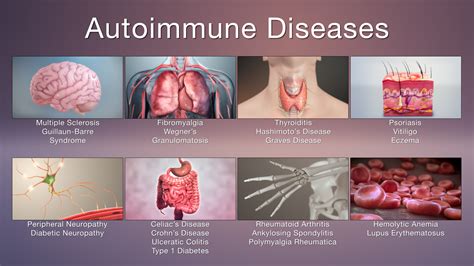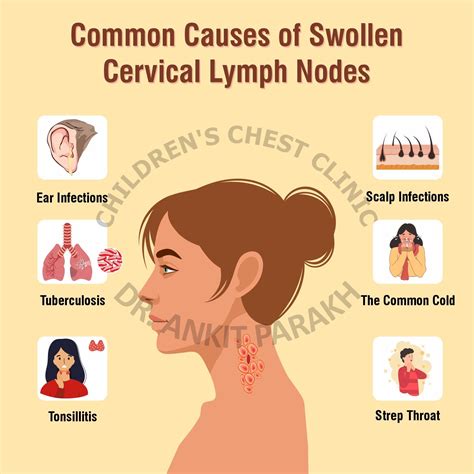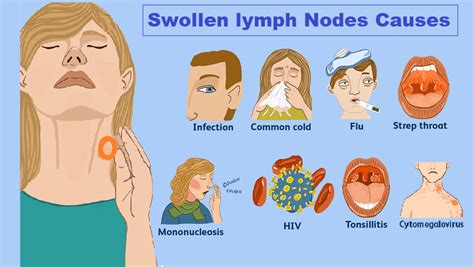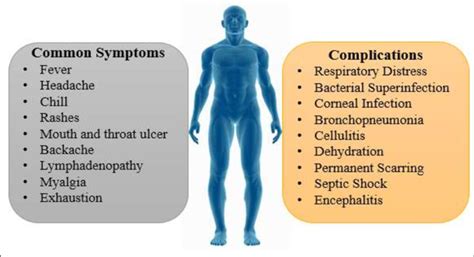Intro
Discover causes of swollen gland under jaw, including infections, allergies, and lymphoma, and learn about symptoms, diagnosis, and treatments for swollen lymph nodes and glandular issues.
The human body is a complex system, and sometimes, it can be alarming to notice unusual changes, such as a swollen gland under the jaw. This phenomenon can be caused by a variety of factors, ranging from minor infections to more serious health issues. Understanding the possible causes and symptoms is essential to seeking proper medical attention and treatment. In this article, we will delve into the world of swollen glands, exploring the reasons behind this condition, its symptoms, and the various approaches to addressing it.
A swollen gland under the jaw, also known as a swollen lymph node, can be a sign that the body is fighting an infection or inflammation. Lymph nodes are an integral part of the immune system, acting as filters that trap and destroy harmful substances, such as bacteria, viruses, and other pathogens. When these nodes become swollen, it may indicate that they are working overtime to combat an infection or disease. The jaw area is particularly prone to swollen lymph nodes due to its proximity to the throat and mouth, where many pathogens can enter the body.
The importance of understanding the causes of swollen glands under the jaw cannot be overstated. By recognizing the signs and symptoms, individuals can take proactive steps towards maintaining their health and seeking medical attention when necessary. This knowledge can also alleviate unnecessary worry and anxiety, as many cases of swollen lymph nodes are treatable with proper care and medication. Furthermore, being informed about the potential causes can encourage individuals to adopt healthy habits and practices that boost their immune system, reducing the risk of infections and diseases.
Common Causes of Swollen Glands Under the Jaw

There are several common causes of swollen glands under the jaw, including infections, autoimmune disorders, and certain types of cancer. Infections such as the common cold, flu, or mononucleosis can cause the lymph nodes in the jaw area to become swollen. Additionally, dental problems, such as abscesses or gum disease, can lead to swollen lymph nodes. Autoimmune disorders, like rheumatoid arthritis or lupus, can also cause the immune system to attack healthy tissues, resulting in swollen lymph nodes. In rare cases, swollen glands under the jaw can be a sign of cancer, such as lymphoma or leukemia.
Infections and Swollen Glands
Infections are one of the most common causes of swollen glands under the jaw. When the body detects the presence of a pathogen, it responds by increasing the production of white blood cells, which are then transported to the affected area via the lymphatic system. As the lymph nodes work to filter out the harmful substances, they can become swollen and tender. Some common infections that can cause swollen glands under the jaw include:- The common cold
- Flu
- Mononucleosis
- Dental infections, such as abscesses or gum disease
- Skin infections, such as cellulitis or impetigo
Autoimmune Disorders and Swollen Glands

Autoimmune disorders occur when the immune system mistakenly attacks healthy tissues, resulting in inflammation and swelling. Some autoimmune disorders that can cause swollen glands under the jaw include:
- Rheumatoid arthritis
- Lupus
- Hashimoto's thyroiditis
- Sjögren's syndrome
Cancer and Swollen Glands
In some cases, swollen glands under the jaw can be a sign of cancer. Lymphoma, a type of cancer that affects the immune system, can cause the lymph nodes to become swollen and enlarged. Leukemia, a type of blood cancer, can also cause swollen lymph nodes. Other types of cancer, such as thyroid cancer or salivary gland cancer, can also cause swollen glands under the jaw.Symptoms of Swollen Glands Under the Jaw

The symptoms of swollen glands under the jaw can vary depending on the underlying cause. Some common symptoms include:
- Swelling or enlargement of the lymph nodes
- Tenderness or pain in the affected area
- Redness or warmth of the skin over the affected area
- Fever
- Fatigue
- Weight loss
- Difficulty swallowing or breathing
Diagnosing Swollen Glands Under the Jaw
Diagnosing swollen glands under the jaw typically involves a physical examination, medical history, and diagnostic tests. The doctor may perform a physical examination to check for tenderness, swelling, or other abnormalities in the affected area. A medical history may be taken to determine if the individual has any underlying medical conditions or has recently been exposed to any infectious agents. Diagnostic tests, such as blood tests, imaging tests, or biopsies, may be ordered to determine the underlying cause of the swollen glands.Treatment Options for Swollen Glands Under the Jaw

The treatment options for swollen glands under the jaw depend on the underlying cause. Some common treatment options include:
- Antibiotics or antiviral medications to treat infections
- Anti-inflammatory medications to reduce swelling and pain
- Immunosuppressive medications to treat autoimmune disorders
- Surgery or radiation therapy to treat cancer
- Self-care measures, such as getting plenty of rest, staying hydrated, and practicing good hygiene
Preventing Swollen Glands Under the Jaw
Preventing swollen glands under the jaw involves practicing good hygiene, getting plenty of rest, and staying hydrated. Individuals can also reduce their risk of developing swollen glands by avoiding close contact with people who have infectious diseases, practicing good oral hygiene, and getting regular check-ups with their doctor.Complications of Swollen Glands Under the Jaw

If left untreated, swollen glands under the jaw can lead to complications, such as:
- Abscesses or pus-filled pockets that can form in the affected area
- Cellulitis or skin infections that can spread to other parts of the body
- Sepsis or blood poisoning that can occur if the infection spreads to the bloodstream
- Cancer or lymphoma that can develop if the underlying cause is not treated
Seeking Medical Attention
Individuals who experience swollen glands under the jaw should seek medical attention if they experience any of the following symptoms:- Severe pain or tenderness in the affected area
- Difficulty swallowing or breathing
- Fever or chills
- Swelling or redness that spreads to other parts of the body
- Weight loss or fatigue
Conclusion and Next Steps

In conclusion, swollen glands under the jaw can be caused by a variety of factors, ranging from minor infections to more serious health issues. By understanding the possible causes and symptoms, individuals can take proactive steps towards maintaining their health and seeking medical attention when necessary. If you are experiencing swollen glands under the jaw, it is essential to seek medical attention to determine the underlying cause and receive proper treatment.
We invite you to share your thoughts and experiences with swollen glands under the jaw in the comments section below. Have you or someone you know experienced swollen glands under the jaw? What were the symptoms, and how was it treated? Your input can help others who may be going through a similar experience.
What are the common causes of swollen glands under the jaw?
+The common causes of swollen glands under the jaw include infections, autoimmune disorders, and certain types of cancer.
How are swollen glands under the jaw diagnosed?
+Diagnosing swollen glands under the jaw typically involves a physical examination, medical history, and diagnostic tests, such as blood tests, imaging tests, or biopsies.
What are the treatment options for swollen glands under the jaw?
+The treatment options for swollen glands under the jaw depend on the underlying cause and may include antibiotics or antiviral medications, anti-inflammatory medications, immunosuppressive medications, surgery, or radiation therapy.
